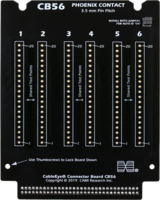New CB56 Test Interface Board is Rated to 1500Vac/dc
Press Release Summary:

- Offers 6 positions for Phoenix Contact connectors or any other connector with 0.14 in. (3.5 mm.) pin pitch
- Preconfigured for Phoenix Contact connectors with graphic and pin map
- Unit is automatically detected and rendered on the screen together with the wiring
Original Press Release:
CAMI Research Releases Test Interface Fixture for Phoenix Contact Connectors, CB56
August 11, 2020 - CAMI Research Inc. (Acton, MA), manufacturer of the CableEye® automation-ready cable and harness test system, has released a test interface board preconfigured for 20-pin Phoenix Contact connectors. Any other connector with a 0.14” (3.5 mm) pitch can also be attached. Rated to 1500Vac/dc, the CB56 may be used on all CableEye models. Connectors not included.
Configuration
A leader in the development of PC-based cable and wire harness test systems, CAMI offers the CableEye suite of products complete with accessories – including auto-detected, plug-in connector boards for fast, convenient set-up and testing of standard cables. There is an extensive and growing stock library of these test fixture boards – several of which are populated with families of connectors, such as the video market’s CB16A for BNC, SMB, SMA, and N connectors. Many boards are sold unconnectorized, a high proportion of which are configured for specific connectors, such as the CB41 through CB44 for Micro D connectors. When pre-populated and pre-configured boards are used, the tester GUI automatically displays a graphic of the connectors and wiring under test. The tester can be readily programmed to do the same for custom boards and fixtures. These boards are designed to fit all CableEye testers.
The CB56, sold without connectors, offers 6 positions for Phoenix Contact connectors or any other connector with 0.14” (3.5 mm) pin pitch. Arranged in three pairs, each pair shares a different set of test points than the other two and so the operator may test a cable that is connected between two different pairs on the same board. The board is preconfigured for Phoenix Contact connectors and ships with Phoenix Contact connector graphic and pin map. As with all standard CB boards, pre-configured connectors under test are instantly, automatically detected and rendered on the screen together with the wiring.
These Phoenix Contact connectors are used in a range of applications including power applications found in medical and automotive markets.
Sold as a set of two boards, each test board may be paired with other CableEye adapter boards to accommodate any combination of connectors. An incredibly versatile test system, CableEye testers are expandable to accommodate large and complex harnesses, and users can connect, and configure them in numerous ways — set up an array of QuickMount™ Housings fitted connector boards, plug custom interface cables directly into any of the 64 pin headers on the control and expansion modules, or use a test interface panel, perhaps on a rack-mounted system. Not just a tester, CableEye is a complete cable management system offering features not available on any other cable test equipment, and may be used to test unlimited types of connectors.
Warranty
All connector boards are included in CableEye’s standard, renewable one-year warranty of the tester for which it was purchased.
Availability & Domestic US Pricing
Available immediately, a CB56 set is $205 (Item 786) and requires CableEye software release dated summer 2020 or later. Includes Phoenix Contact connector graphics and pin map. Rated to 1500Vac/dc. Certification at 1500Vac/dc is available and must be requested at the time of order.
Contact sales@camiresearch.com or (978) 266-2655 for a quote.
Note: Prices are USA only and subject to exchange rates, freight and import costs. Contact your local authorized distributor for local pricing.
CAMI Research produces expandable and upgradable diagnostic Cable & Harness Test Systems for assembly, prototyping, production, and QC of standard or custom cables. CableEye® Testers display, and document basic electrical properties such as continuity, resistance, capacitance, dielectric breakdown, insulation resistance, miswires, and intermittent defects. camiresearch.com




